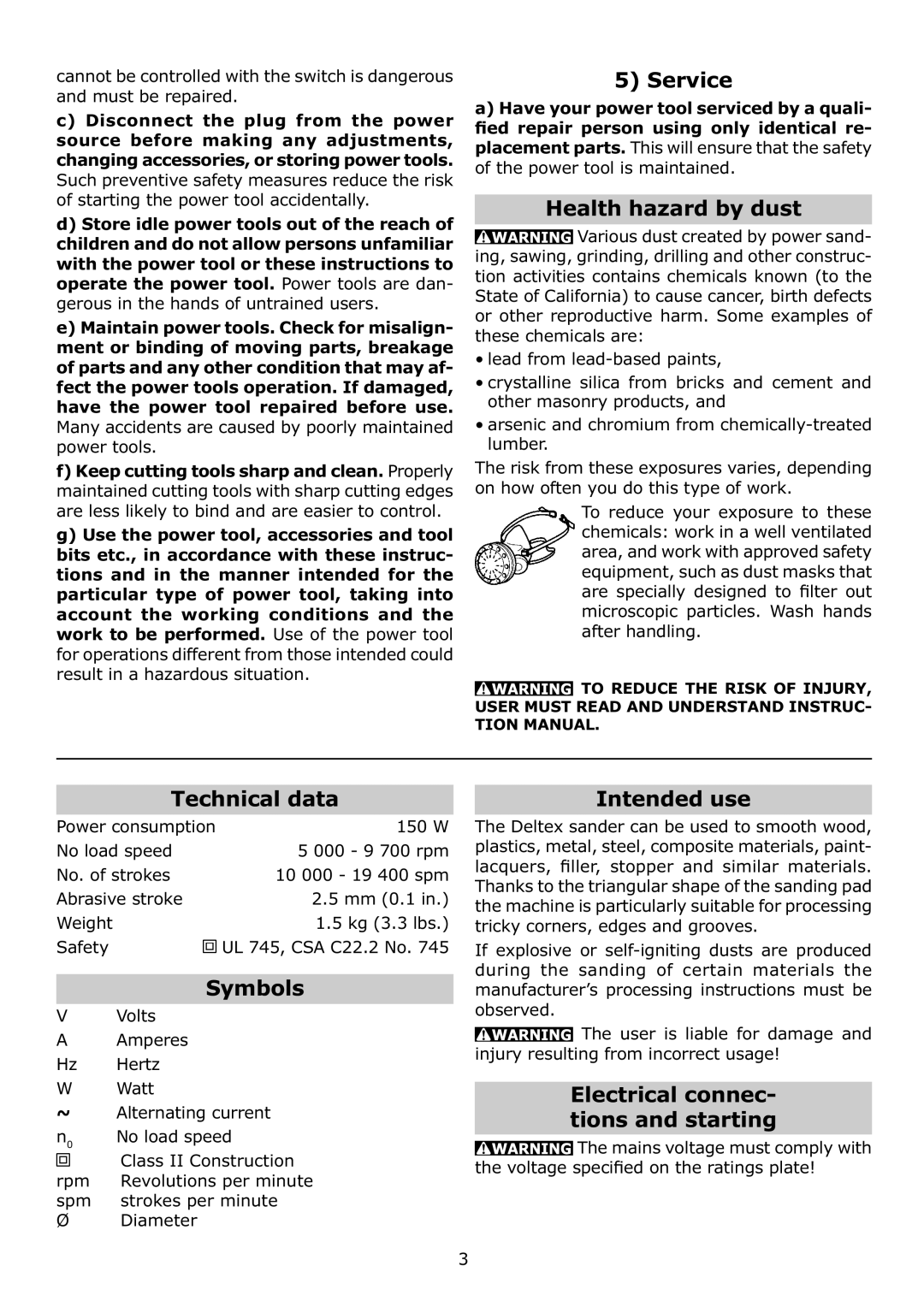
cannot be controlled with the switch is dangerous and must be repaired.
c)Disconnect the plug from the power source before making any adjustments, changing accessories, or storing power tools. Such preventive safety measures reduce the risk of starting the power tool accidentally.
d)Store idle power tools out of the reach of children and do not allow persons unfamiliar with the power tool or these instructions to operate the power tool. Power tools are dan- gerous in the hands of untrained users.
e)Maintain power tools. Check for misalign- ment or binding of moving parts, breakage of parts and any other condition that may af- fect the power tools operation. If damaged, have the power tool repaired before use. Many accidents are caused by poorly maintained power tools.
f)Keep cutting tools sharp and clean. Properly maintained cutting tools with sharp cutting edges are less likely to bind and are easier to control.
g)Use the power tool, accessories and tool bits etc., in accordance with these instruc- tions and in the manner intended for the particular type of power tool, taking into account the working conditions and the work to be performed. Use of the power tool for operations different from those intended could result in a hazardous situation.
5)Service
a)Have your power tool serviced by a quali- fied repair person using only identical re- placement parts. This will ensure that the safety of the power tool is maintained.
Health hazard by dust
![]() Various dust created by power sand- ing, sawing, grinding, drilling and other construc- tion activities contains chemicals known (to the State of California) to cause cancer, birth defects or other reproductive harm. Some examples of these chemicals are:
Various dust created by power sand- ing, sawing, grinding, drilling and other construc- tion activities contains chemicals known (to the State of California) to cause cancer, birth defects or other reproductive harm. Some examples of these chemicals are:
•lead from
•crystalline silica from bricks and cement and other masonry products, and
•arsenic and chromium from
The risk from these exposures varies, depending on how often you do this type of work.
To reduce your exposure to these chemicals: work in a well ventilated area, and work with approved safety equipment, such as dust masks that are specially designed to filter out microscopic particles. Wash hands after handling.
![]() TO REDUCE THE RISK OF INJURY, USER MUST READ AND UNDERSTAND INSTRUC- TION MANUAL.
TO REDUCE THE RISK OF INJURY, USER MUST READ AND UNDERSTAND INSTRUC- TION MANUAL.
Technical data
Power consumption | 150 W |
No load speed | 5 000 - 9 700 rpm |
No. of strokes | 10 000 - 19 400 spm |
Abrasive stroke | 2.5 mm (0.1 in.) |
Weight | 1.5 kg (3.3 lbs.) |
Safety | UL 745, CSA C22.2 No. 745 |
Symbols
VVolts
AAmperes
Hz Hertz
WWatt
~Alternating current
n0 | No load speed |
| Class II Construction |
rpm | Revolutions per minute |
spm | strokes per minute |
ØDiameter
Intended use
The Deltex sander can be used to smooth wood, plastics, metal, steel, composite materials, paint- lacquers, filler, stopper and similar materials. Thanks to the triangular shape of the sanding pad the machine is particularly suitable for processing tricky corners, edges and grooves.
If explosive or
![]() The user is liable for damage and injury resulting from incorrect usage!
The user is liable for damage and injury resulting from incorrect usage!
Electrical connec-
tions and starting
![]() The mains voltage must comply with the voltage specified on the ratings plate!
The mains voltage must comply with the voltage specified on the ratings plate!
3
